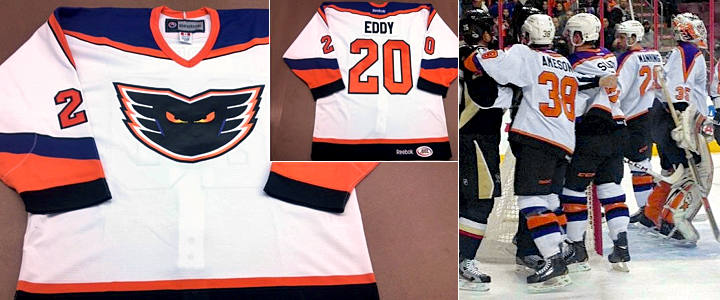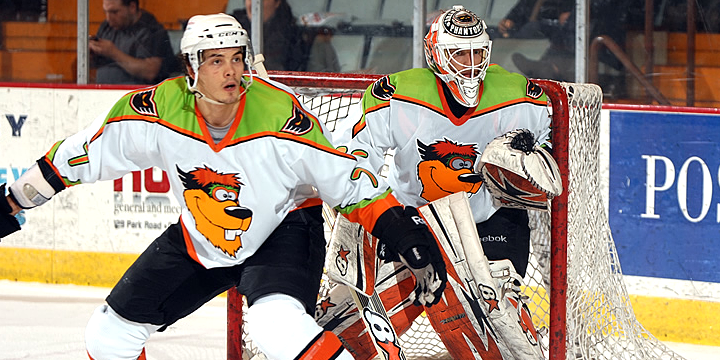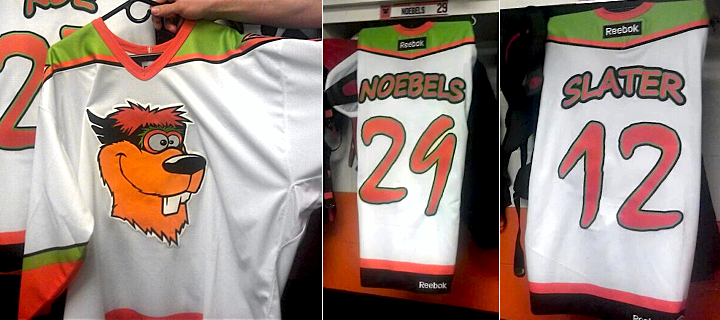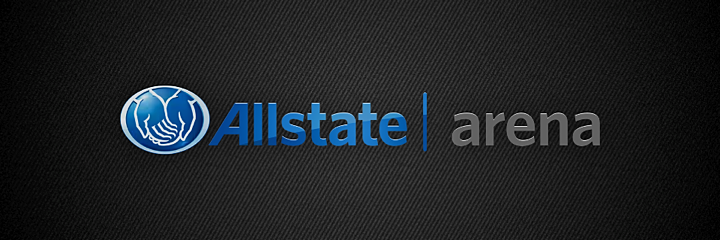The AHL Will Look Different Next Fall
 Tuesday · Apr 16 · 2013 | 1:33 AM PDT
Tuesday · Apr 16 · 2013 | 1:33 AM PDT  24 Comments
24 Comments In this post, I'm hoping to catch us all up on some recent AHL news I haven't had a chance to write about. There will be new affiliations and some relocations and just general upheaval.

Canucks buy Rivermen, could move them to B.C.
We start in Illinois. Earlier this month, the Vancouver Canucks agreed to purchase the AHL's Peoria Rivermen from the St. Louis Blues. The deal, announced April 1, means starting next season, we'll have a couple of NHL/AHL affiliate swaps.
Obviously, the Canucks will be aligning with their new asset in Peoria. Only they don't appear to be staying in Peoria. According to the Vancouver Sun, the club will pack up and find a new city closer to the west coast. Where might that be?

Heat may leave Abbotsford for Utica, N.Y.
The Abbotsford Heat and owner Calgary Flames are in a spot of trouble. Things aren't really working out in B.C. See, British Columbians don't seem all that eager to cheer on the future of their enemy. Most of them are Canucks fans after all.
So where does that leave us? The Flames are apparently content with nearby Abbotsford, but clearly a Canucks-affiliated team would be a better draw. If the Rivermen find themselves in B.C. next season, where would the Heat go? I can't say, but it would be the franchise's fifth home in a decade.
From 1993 to 2003, the Saint John Flames played in New Brunswick. After that, there was a two-year suspension of the franchise followed by relocations every other year from Omaha, Neb. in 2005 to Moline, Ill. in 2007 and finally to Abbotsford in 2009.
UPDATE (4/16): A number of you have correctly pointed out that Utica, N.Y. is apparently the most likely place for the Heat to move given a February report that the Flames may sign a 10-year affiliation agreement with the city. What's funny is that Utica is where the franchise was based 20 years ago — prior to being in New Brunswick. Only then, then were affiliated with New Jersey and known as the Utica Devils. Will they keep the Heat moniker or go with something better?

Blues likely to enter affiliation with Wolves
So back to the Rivermen. They'll be ending their arrangement with the St. Louis Blues, who'll presumably pick up the Canucks' sloppy seconds, the Chicago Wolves. Geographically, it makes sense too. So no surprise there.

Aeros may leave Houston for Des Moines, Iowa
What is surprising, however, is that we could be witnessing the end of a 20-year run of pro hockey in Houston, Texas. The Houston Aeros apparently can't come to terms on a new arena deal. You know what that means. Relocation, relocation, relocation.
Word is, they've been eyeing Peoria — should the Rivermen be moved by the Canucks. In which case, my money says the storied Rivermen identity never skips a beat. The Aeros become the "new" Rivermen and the "old" Rivermen get a completely new identity in Abbotsford or elsewhere.
But if the Canucks can't get the Rivermen out of Peoria, the Aeros would still have to find a new home. The Minneapolis Star-Tribune believes Des Moines, Iowa could be a good possibility. It's closer to NHL affiliate Minnesota Wild but less convenient when it comes to air travel and call-ups.
So there you have four AHL teams that could look very different next fall. But they won't be alone.
Other leagues will look different, too
Elsewhere, other changes are in the works:
- The OHL's Brampton Battalion are on the move. The league approved the relocation to North Bay, Ont. back in November. It doesn't appear their name or logo will change — they have already been renamed the North Bay Battalion, according to the team's official website.
- Brampton, Ont. loses one CHL for another. The Central Hockey League swooped in with an expansion team for 2013-14, which recently got its official name — the Brampton Beast. (Think the IceHL's Boulder Beasts might have something to say about that?) The club doesn't have a logo yet, but this is the CHL's first foray into Canada.
- The CHL will also welcome the St. Charles Chill this season. You may recall the team named a winner in its logo design contest back in November.
- UPDATE (4/16): JanBan (comments) reminded me that the QMJHL's P.E.I. Rocket will be rebranding this summer. Their new name, announced last September, is P.E.I. Islanders. You can currently get 50% off Rocket merchandise from the team store.
If I've overlooked anything, please let me know. We'll have a lot to keep an eye on this summer as teams move around and new logos get unveiled. Stick around!
 Chris
Chris

Whale could revert to Wolf Pack moniker in 2013
Almost left out these guys. According to a report back in February, the Connecticut Whale could go back to being the Hartford Wolf Pack next season. Rather than re-hashing it here I'll let you read the linked article for more details. I have no new information since that was posted.
If there are others I'm leaving out, keep them coming. Want to make this a comprehensive post.












































